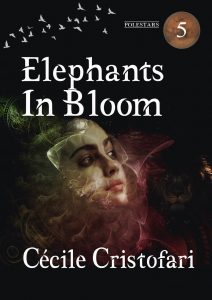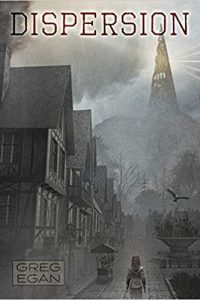Niall Harrison Reviews Elephants in Bloom by Cécile Cristofari
 Elephants in Bloom, Cécile Cristofari (NewCon Press 978-1-91495-367-5, 240pp, £26.99, hc) January 2024. Cover by Enrique Meseguer.
Elephants in Bloom, Cécile Cristofari (NewCon Press 978-1-91495-367-5, 240pp, £26.99, hc) January 2024. Cover by Enrique Meseguer.
Cécile Cristofari’s debut collection Elephants in Bloom is, as debut collections so often are, exciting but uneven. Perhaps my favourite story, “Soaring, the World on Their Shoulders” (2020), demonstrates the combination of imagination and precision that she can bring to bear. What begins as a relatively standard dystopian setting, with France voting for a far-right government, followed by militarisation and crackdowns on undesirables, is gradually elaborated, deepened, and finally transformed. The narrator negotiates her way through the regime, collaborating for a time – the emotional nuances of this are beautifully captured – before escaping with her top-secret research project, which is revealed to be an egg from which will hatch a living spaceship. It is a moment of wild inventiveness, captured with vivid specificity, that serves to break the oppressive atmosphere open. Similarly, in “The Third Time I Saw a Fox” (2020), an eerie museum curator communes with the exhibits – the skeletons and stuffed animals – and then goes outside for the first time in a long time and Cristofari captures an extraordinary, rhapsodic glimpse of springtime, “life everywhere, never extinguished, only dormant.” And “The Owl Woman” and “The Goddess’s Spear”, both new here, are compelling, closely observed anthropological SF, imagining Cristofari’s home region of Provence tens of thousands of years in the past to present thoughtful explorations of gender roles and agency. And Provence is the setting again for “Wind, River, Angel Song” (2022), an affecting near-future tale in which environmental collapse is ongoing, a strange virus is turning people into trees, and a mother has to decide how she feels about bringing new life into the world. Writers who came to mind as I was reading these stories include Nina Allan, Holly Phillips, and Carol Emshwiller: good company.
The stories that failed to capture me so completely often had left-turn endings as well, but ones that felt as though they simplified or reduced the meaning of the story, rather than opening it up. “The Fishery” (2023) is the prototypical example here: The story describes the operation of a vast enterprise that strips entire solar systems of their psychological and emotional qualities, “sounds and light and dreams and life,” to feed the home population, and, in its first two-thirds, deftly elaborates this conceit into an allegory for our own rapacious consumption of Earth’s resources. We rotate through a variety of perspectives, from an environmental inspector to a factory overseer to a fisherman. We see “home-made nibbles: tiny reflections in drops of freshwater that tasted like morning” and hear about restaurants that fleece their customers but are decorated, to convey authenticity, “with real preserved storm clouds,” and many other striking images, curated with just the right balance of whimsy and elegy.
But then, for me, the misstep: In search of fresh catch, the fisherman’s ship visits the system of “a yellow sun” in which two planets bear life, “one cold and hidden under ice, the other spread between oceans and stretches of rocky ground.” The story does not confirm the latter planet as Earth, but when the sailors tune into the song from a massive sea-creature, I found it hard to avoid the assumption. Abruptly, the allegory collapsed: the fishery is, somehow, in our universe. And then the crew decide to leave this planet, of all planets – “a world so bountiful even the sea had its song” – untouched. To be clear, I think the story takes a wrong turn as soon as it introduces the probable Earth; but of the possible endings I can imagine from that decision, this sudden change of heart is the least satisfying.
A story that I think reaches out to touch the real more convincingly is “Que la Grenade Est Touchante” (2021). In the aftermath of World War One, the environment is out of joint, and things are growing unruly and strange. The narrator relates their family history: Their father, a French soldier of African heritage, manages to befriend a German botanist, and negotiates a week of truce to allow for the investigation of a rare plant growing near the trenches. On reaching the closing peroration about how, in a hundred years’ time, a granddaughter will write their story, I guessed that Cristofari was writing a tribute to her own family history – a guess confirmed by the story’s afterword – but where the equivalent on-the-nose moment in “The Fishery” bumped me out of the story, here I was carried through, I think because it felt more emotionally consistent with the existing frame of the tale. I did wonder whether the afterwords (every story has one) would have worked better grouped at the end of the book, rather than immediately after the relevant story: I do love that sort of paratext, but more than once I felt a little hurried towards an interpretation.
The collection is perhaps also overgenerous, diluting the impact of Cristofari’s best work. Of eighteen tales in total, eight are new, and I didn’t feel the briefest of these, such as “Kings of Snow” (nativity in postapocalyptic Québec) or “Ice Cream from Pluto” (fabulist voyage in which a mother follows her young son to Pluto to discuss grieving), added much. But there is certainly enough here to keep me curious about what Cristofari will do next. The collection’s title story concludes the proceedings, and surely not accidentally: It feels like a mission statement. God is dead, we learn, and their body has fallen onto the mountains. Victor, a fourteen-year-old boy, is torn between loyalty to his mother, who mines God’s body in an attempt to understand its nature, and Illana, a slightly older girl who is a Child of Charity, and still seeks meaning in religion. The strangeness of the setting is evoked effectively, as we have by this point come to expect, but hardly prepares us for the ending, in which Victor eats the fruit of God’s corpse and has a transcendental moment of communion with what might be God-in-Earth, which makes clear that God’s death is a kind of whalefall: a marker of tragedy, yes, but also a moment of potential renewal. Things are worth saving, even if much has been lost. It is worth trying to be better. “New truths were ours to make,” reflects Victor, “to use in whatever way we wished.” In darkening times, a search for new truths takes Cristofari’s gaze in interesting directions.
In Niall Harrison‘s spare time, he writes reviews and essays about sf. He is a former editor of Vector (2006-2010) and Strange Horizons (2010-2017), as well as a former Arthur C. Clarke Award judge and various other things.
This review and more like it in the June 2024 issue of Locus.
 While you are here, please take a moment to support Locus with a one-time or recurring donation. We rely on reader donations to keep the magazine and site going, and would like to keep the site paywall free, but WE NEED YOUR FINANCIAL SUPPORT to continue quality coverage of the science fiction and fantasy field.
While you are here, please take a moment to support Locus with a one-time or recurring donation. We rely on reader donations to keep the magazine and site going, and would like to keep the site paywall free, but WE NEED YOUR FINANCIAL SUPPORT to continue quality coverage of the science fiction and fantasy field.
©Locus Magazine. Copyrighted material may not be republished without permission of LSFF.






